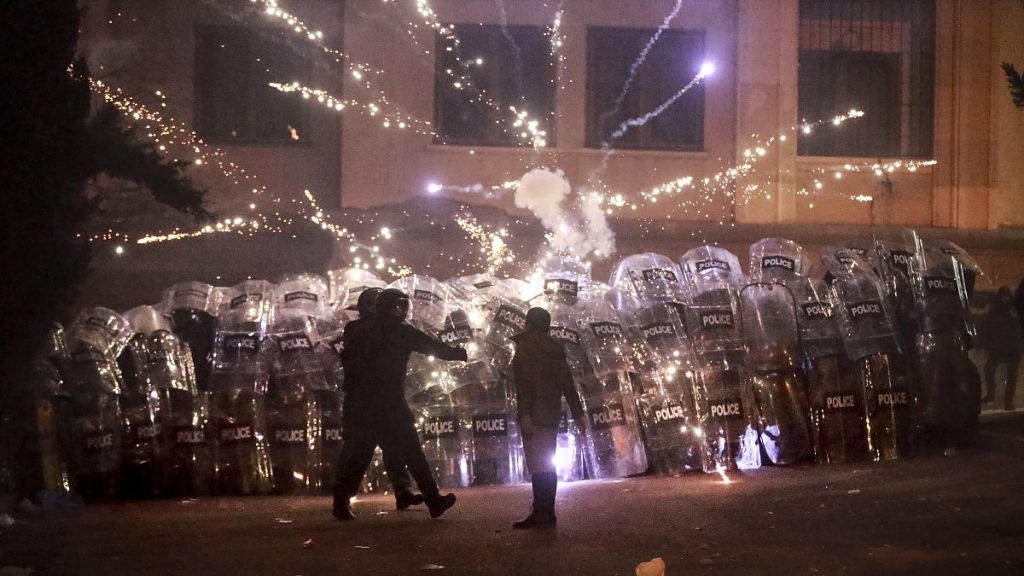Recent unrest in Georgia has escalated dramatically, resulting in at least 44 people being hospitalized amid violent clashes between police and protesters. The turmoil is rooted in widespread discontent over the Georgian government’s decision to suspend European Union accession talks. This announcement has sparked significant public outrage, leading to protests that have persisted for four consecutive nights, primarily concentrated outside the parliament building in the capital, Tbilisi. Demonstrators, numbering in the tens of thousands, have resorted to throwing stones and fireworks at police, who have responded with tear gas, pepper spray, and water cannons in efforts to disperse the crowds. The escalating violence highlights the deepening fractures in Georgian society and raises concerns about the government’s approach to civil dissent.
The protests were ignited following the Georgian Dream party’s announcement about the EU accession talks, which were put on hold until at least 2028 in the wake of the European Parliament’s disapproval of the parliamentary elections held on October 26. The ruling party’s re-election has come under scrutiny, with international observers citing incidents of violence, bribery, and electoral malpractice, leading to accusations that Georgia’s democratic processes are deteriorating. Prime Minister Irakli Kobakhidze has defended the government’s stance, arguing that their rejection of the previous EU framework does not signal an end to Georgia’s European integration efforts. He asserted that the government would crack down on any unlawful activities associated with the protests, promising that those instigating violence would face consequences.
The European Union’s recent decision to suspend negotiations for Georgia’s membership constitutes a significant shift in the country’s political landscape. Since gaining candidate status in December 2023, Georgia has grappled with necessary reforms outlined by Brussels, reforms that have stalled due to controversial legislation that critics believe undermines democratic principles. The introduction of laws limiting freedoms, especially around speech and LGBTQ+ rights, has drawn parallels to Russia’s authoritarian tactics. As criticisms mount regarding Georgian Dream’s increasing authoritarianism and perceived alignment with Moscow, the social climate has further deteriorated, resulting in a palpable sense of urgency among protestors advocating for a return to democratic norms.
President Salome Zourabichvili has entered the fray by defying calls to step down when her mandate ends this month, reaffirming her support for ongoing protests and labeling the Georgian Dream government as illegitimate. Her insistence on retaining her position reflects broader fears concerning governmental legitimacy among a populace increasingly willing to express dissent. Zourabichvili noted the unprecedented scale of the protests, pointing out that the citizens’ motivations extend beyond political grievances to encompass larger socio-political dynamics influenced by regional geopolitics, particularly Russia’s maneuvers around the Ukraine conflict.
In an insightful commentary, Zourabichvili offered a grand narrative that situates Georgia’s current plight within a broader geopolitical context, suggesting that Russia is engaging in an “electoral war” aimed at weakening Western influence and destabilizing nations like Georgia, Romania, and Moldova. This framing suggests that the conflict is not only about domestic governance but also about navigating pressures from a reinvigorated Russia intent on shifting territorial allegiances in its favor. The president’s remarks highlight the complexities of the situation, wherein internal dissatisfaction is compounded by external geopolitical maneuverings, creating a precarious environment for Georgian civil society.
As protests persist and tensions run high, the challenge facing both the Georgian government and its populace is how to reconcile aspirations for European integration with the realities of internal dissent and external influence. The coming days and weeks will be critical as both sides navigate this complex landscape, with implications for Georgia’s democratic trajectory and its relationship with the European Union. The current unrest may serve as a catalyst for a more significant political reshuffling in the years to come, potentially redefining the country’s political landscape as well as its future within the wider European context.














